|
|
|
Sort Order |
|
|
|
Items / Page
|
|
|
|
|
|
|
| Srl | Item |
| 1 |
ID:
117041


|
|
|
|
|
| Publication |
2012.
|
| Summary/Abstract |
Recently, theorists have sought to justify transnational democracy by means of the all-affected principle, which claims that people have a right to participate in political decision-making that affects them. I argue that this principle is neither logically valid nor feasible as a way of determining the boundaries of democratic communities. First, specifying what it means to be affected is itself a highly political issue, since it must rest on some disputable theory of interests; and the principle does not solve the problem of how to legitimately constitute the demos, since such acts, too, are decisions which affect people. Furthermore, applying the principle comes at too high a cost: either political boundaries must be redrawn for each issue at stake or we must ensure that democratic politics only has consequences within an enclosed community and that it affects its members equally. Secondly, I discuss three possible replacements for the all-affected principle: (a) applying the all-affected principle to second-order rules, not to decisions; (b) drawing boundaries so as to maximise everyone's autonomy; (c) including everyone who is subject to the law. I conclude by exploring whether (c) would support transnational democracy to the extent that a global legal order is emerging.
|
|
|
|
|
|
|
|
|
|
|
|
|
|
|
|
| 2 |
ID:
117045
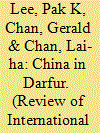

|
|
|
|
|
| Publication |
2012.
|
| Summary/Abstract |
Most people hold that in its quest for natural resources abroad, China shields rogue states with egregious human-rights record from international opprobrium and sanctions. Its political support for Sudan is a case in point. By examining Chinese perspectives on humanitarian intervention and national sovereignty, this article first argues that Beijing's interests are so multiple and complex that concern about the implications of humanitarian intervention for national integration is more crucial than oil in determining its policy towards Sudan. Paradoxically it asserts that China, a non-democratic country, is more influential than liberal democratic states in making the rules of humanitarian intervention in Darfur because of a lack of political will in the West. In addition, there are early signs that China intends to utilise its newfound power to remake international rules regarding territorial sovereignty. Further development is likely to be shaped by its interactions with the United States.
|
|
|
|
|
|
|
|
|
|
|
|
|
|
|
|
| 3 |
ID:
117044
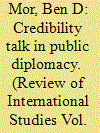

|
|
|
|
|
| Publication |
2012.
|
| Summary/Abstract |
Politics has become a contest of competitive credibility', argued Nye in Soft Power. Indeed, being perceived as honest and reliable is a necessary condition for obtaining and holding the attention of target audiences, as well as for effective persuasion, which is the objective of strategic communication. This task has become all the more difficult with the explosion of information sources and the discreditation efforts of opponents, but it is an essential element in the conduct of public diplomacy. How, then, do states and other international actors go about establishing their credibility while undermining that of opponents? This article employs rhetorical theory, impression management theory, and account theory to situate contests of credibility within the broader context of the accountability of social conduct. The theoretical part discusses the rhetorical strategies that actors use to credit their accounts and discredit those of their rivals. The empirical part addresses the debate between Israel and human rights groups over the Qana bombing incident of July 2006. The analysis of the blame imposition strategies used by Amnesty International and Human Rights Watch and the accounts offered by Israel, indicates the range and variability of credibility talk and the rules for crediting accounts that underlie it.
|
|
|
|
|
|
|
|
|
|
|
|
|
|
|
|
| 4 |
ID:
117040
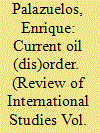

|
|
|
|
|
| Publication |
2012.
|
| Summary/Abstract |
This article has been constructed under the premise that International Political Economy provides the appropriate analytical tools for understanding the characteristics and performance of oil in economic and political relations. The article argues the need to articulate three levels of analysis (major players, scenarios, and exchange mechanisms) in order to understand the economic and political relations that underpin oil exchange during last decades. The central conclusion is that the current oil system is characterised by a set of asymmetric, unstable, and ungovernable relations, whose consequences are unpredictable but not necessarily traumatic.
|
|
|
|
|
|
|
|
|
|
|
|
|
|
|
|
| 5 |
ID:
117042
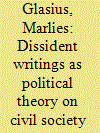

|
|
|
|
|
| Publication |
2012.
|
| Summary/Abstract |
This article offers an analysis of precisely how civil society and its relation to democracy were conceptualised by its East European and South American proponents in their pre-democratic contexts, through an examination of declarations, newspaper articles, samizdat essays, diaries, letters from prison, academic articles and prize acceptance speeches written at the time. The analysis of these source materials is organised under three main themes: the first concerns activists' understanding of the nature of the regime, its aims and its relation to society; the second relates to the features of the emergent civil society the writers of these documents desired, observed, and helped to create; and the final section discusses their strategies and aspirations in relation to 'democratisation'. On the basis of an analysis of commonalities in ideas across these two very different regional and ideological contexts, hypotheses are formulated as building blocks for a political theory of civil society under authoritarian rule, which may apply in yet other, contemporary contexts.
|
|
|
|
|
|
|
|
|
|
|
|
|
|
|
|
| 6 |
ID:
117043


|
|
|
|
|
| Publication |
2012.
|
| Summary/Abstract |
This article contributes to the growing subfield of research on religion and International Relations (IR) by discussing ways to take substantial and sui generis aspects of religion into account. It is argued that IR scholars need more critical methodological and conceptual reflection on how to integrate religion in order to navigate between two typical analytical positions: either focusing on the instrumental relevance of religion only or treating religion as an unchangeable meta-category and delinking it from its practitioners or context. The article first discusses why there is a need to be attentive to distinctive aspects of religion and then moves on to scrutinise three IR-relevant pathways to include these aspects of religion in analysis, namely religion as belief community, religion as power, and religion as speech act. It appears that future research along these lines can contribute significantly to the way IR scholars habitually think about key issues such as parameters of behaviour, standards of legitimacy, and the dynamics of conflicts.
|
|
|
|
|
|
|
|
|
|
|
|
|
|
|
|
| 7 |
ID:
117046
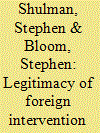

|
|
|
|
|
| Publication |
2012.
|
| Summary/Abstract |
The empirical and theoretical study of the effect of foreign intervention in the electoral processes of states is exceedingly weak. Using insights from the nationalism literature, this article provides a theoretical argument on domestic reactions to foreign interference in a state's internal politics. It then tests the predictions generated by the argument using mass survey data in Ukraine. The article analyses the Ukrainian people's reaction to Western and Russian intervention in the 2004 presidential elections - the Orange Revolution. We find that efforts by Western governments, international organisations, and non-governmental organisations to shape Ukraine's electoral landscape appear to be unwelcome to average Ukrainians while electoral interference by a non-democratic state, Russia, is seen as less alienating. Our theoretical framework accounts for these potentially surprising results.
|
|
|
|
|
|
|
|
|
|
|
|
|
|
|
|
| 8 |
ID:
117039
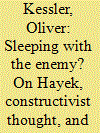

|
|
|
|
|
| Publication |
2012.
|
| Summary/Abstract |
The current economic crisis challenges the constitutive rules of global finance. Despite its various roots, dynamics, and consequences, the current reform debate is surprisingly limited in scope: it focuses on possible changes of Basle II and thus banking regulation only. This article suggests that the reason for this 'gap' can be found in the idea of asymmetric information. The idea that the asymmetric dispersion of information is the 'real' cause of the crisis is reiterated constantly in public documents. However, the argument rests upon two assumptions: that crises are exogenous to otherwise efficient and stable markets, and that finance is an autonomous field where the primary focus of the current reform can then concentrate on its laws. It is thought that it is enough to reform financial markets to stabilise the global economy. This article suggests that this belief is utterly misguided and argues that a more comprehensive picture of the current turmoil needs to abandon exactly these two assumptions. To pursue such an avenue, this article provids an interpretation of Hayek's social theory.
|
|
|
|
|
|
|
|
|
|
|
|
|
|
|
|
|
|
|
|
|